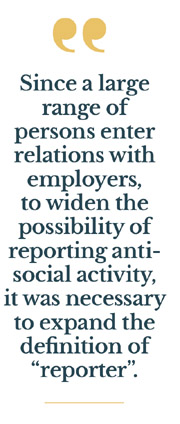The primary objective of the Directive is to set up measures for prevention of European Union Law breaches to enhance transparency and accountability. Another objective is to ensure that persons who report illegal behavior are effectively protected against retaliation.
European regulation related to the protection of whistleblowers also aligns with ESG requirements - ESG stands for Environmental, Social, Governance. Specifically in relation to the “S” aspect within the ESG framework, the whistleblowing regulation is an important element of employer-employee and other stakeholder relations and supplements the creation of a suitable working environment. Considering the “G” aspect of the ESG framework, whistleblowing is a tool used to swiftly reveal illegal, corrupt, or unethical practices at an internal level and decrease the risk of sanctions from a public authority for non-compliance.
Prior to the amendment resulting from implementation of the Directive, only employees of the respective employer could be considered as reporters of anti-social activities and granted protection under the Act. Since a large range of persons enter relations with employers, to widen the possibility of reporting anti-social activity, it was necessary to expand the definition of “reporter”. The definition was extended to include a person who has entered into pre-contractual relations, a person after termination of employment, and a third person who is a contractor of the employer, provided that specific statutory criteria are met. As a result, the above persons are granted protection provided by the Act.
 Protection under the Act is only applicable to reporters who report anti-social activities defined by the Act. The scope of anti-social activities was also expanded by the amendment. A list of specific crimes that are considered as anti-social activities regardless of the penalty amount was expanded to include theft and fraud and specific economic, cyber and environmental crimes. Additionally, the upper limit of the crime penalty rate was lowered from three to two years, which extended the scope of the Act significantly.
Protection under the Act is only applicable to reporters who report anti-social activities defined by the Act. The scope of anti-social activities was also expanded by the amendment. A list of specific crimes that are considered as anti-social activities regardless of the penalty amount was expanded to include theft and fraud and specific economic, cyber and environmental crimes. Additionally, the upper limit of the crime penalty rate was lowered from three to two years, which extended the scope of the Act significantly.
The reporting of anti-social activity intersects with the protection of trade secrets and the statutory obligation of secrecy, which is imposed on employees in sectors such as postal services, banking, telecommunications, healthcare, etc. As the obligation to protect trade secrets was excluded from the list of protected information under the Act, an employer is no longer entitled to claim compensation in the event of the reporting of information considered to be a trade secret, provided that alleged anti-social activity was reported, bona fide, and the extent of the reported information was minimized to a need to know basis.
The Act is focused on protection against retaliation against a reporter. Retaliation is considered to be any direct or indirect conduct or omission in relation to the employment or other relationship, which is prompted by a disclosure, which causes, or may cause, unjustified damage to the reporter. It is prohibited to retaliate against a reporter, against a person related to the reporter, and natural or legal persons connected to the reporter as specified by the Act. It must be emphasized that any threat of retaliation is also qualified as retaliation. The Act also contains a non-exhaustive list of retaliation practices, which include termination of employment, termination of the commercial contract, deterioration of working conditions, and other similar practices that may cause damage, or worsen conditions for the reporter. The most severe statutory monetary sanctions, up to EUR 200 000, may be imposed in the event of retaliation against a reporter or other protected persons.
Prior to the amendment of the Act, it was possible to outsource the performance of tasks under the Act and internal whistleblowing policy to a designated person. As a result of the amendment to the Act, outsourcing was limited such that a designated person must be a person or an organizational unit within the organizational structure of the employer. Studies show that the majority of reporters of anti-social activities prefer to report such information internally, within the organization where they work. The scope of outsourcing permitted depends on the size of the employer, and stricter rules apply for public authorities as defined by the Act. Employers with more than 250 employees and public authorities may only outsource the acceptance of reports. In addition to the acceptance of reports, employers with less than 249 employees may also outsource the processing of reports. However, it is not possible to outsource the performance of tasks of a designated person, which must be appointed within the organizational structure of employer.
Dagmar Yoder, Partner, Deloitte Legal
Veronika Patúšová, Managing Associate, Deloitte Legal




Follow us